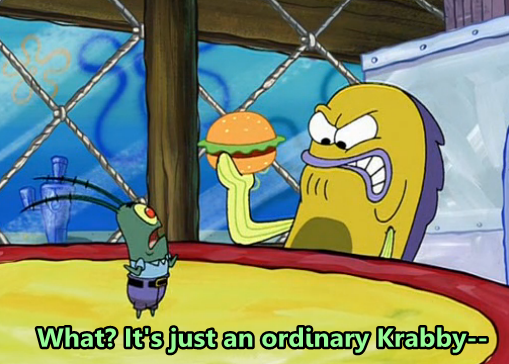
If you were wondering, the punchline is, "Well, a cow like that, you don't eat all at once!" It appears there was this cow, and -" at which point the Bursar stops listening because he's heard it before and the Archchancellor always gets the punchline wrong anyway. In Reaper Man, Ridcully, making a speech at Windle Poons's "going away party", starts out "You know, seeing old Windle sitting here tonight puts me in mind, as luck would have it, of the story of the cow with three wooden legs.Blabber Mouth by Morris Gleitzman briefly mentions a joke about an octopus and a combine harvester, which is apparently only funny if you tell it in sign language.Lewis Carroll eventually came up with the answer "Because it can produce a few notes, though they are very flat and it is nevar put with the wrong end in front!" Alice's Adventures in Wonderland: The famous "Why is a raven like a writing desk?" is never given an answer (a common answer is "Poe wrote on both of them").Surprisingly subverted sixteen years later, where the original story's author revealed the prankjoke's actual (and kinda disappointing) punchline inside another, completely unrelated story ( ".with a very low ceiling and.Ouch.") For the whole story only the setup ("A very tall guy enters a bar.") is heard: this actually was used by the magazine it was first published to launch a contest where readers could create their punchline to the joke. The Mickey Mouse comic " Topolino e la dilagante scherzelletta " features a villain that creates the ultimate joke (known as the "prankjoke") that induces everyone into endless laughter, allowing him to steal everything without being interrupted.

It is revealed at the end of a later chapter when a Fourth Wall-breaking imp asks him for it ( they take the horses to a vet, who tells them the black one is slightly bigger than the white one). were already cut), but when Etrigan asks for the punchline, it isn't shown to the reader.

This famous limerick appeared in Princeton University’s humor magazine Princeton Tiger in 1902 and details the bad luck of an unfortunate man from Nantucket: (Originally published in Tommy Thumb’s Songbook in 1744.) Here’s one you may recall-and probably didn’t even realize it was a limerick! Limericks tend to be popular in children’s literature. Here’s a limerick on the state of novels by classic sci-fi author H.G. Though the limerick has a reputation for tackling frivolous, humorous subject matter, even the most well-known authors have had fun with the form. With anapest, the leading few words or syllables are short, and the final syllables are usually longer and more stressed. Limericks are written using the anapest rhythm/metering system.

The third and fourth lines also rhyme, creating a total rhyme scheme of AABBA. Typically, a limerick is just five short lines with the first, second, and fifth lines rhyming. Since then, limericks have woven their way into literature and the hearts of many amused readers. Lear’s A Book of Nonsense featured several limericks accompanied by related illustrations. Limericks came into mainstream popularity during the mid-1800s thanks to author and poet Edward Lear. The oldest discovered text in the limerick format was a Latin prayer written sometime during the thirteenth century. Often humorous, sometimes naughty, yet always entertaining, limericks are believed to have originated in (no, not in Nantucket-but we’ll get to that) Ireland’s County of Limerick.


 0 kommentar(er)
0 kommentar(er)
